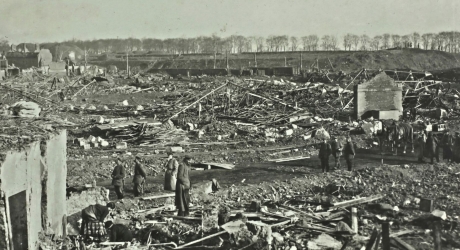Violence erupts when anger goes unchecked. In life people have undesirable experiences on an almost daily basis: this is an integral part of our lives and it is what builds up a kind of suppressed anger in most human beings. Then, when some provocative situation arises, that latent anger flares up leading to violence and at times to war. A permanent solution to this scourge would be to find an effective method of stemming this flood of anger.
The best way would be to keep in mind the historic contribution of humanity at large. This realization would serve as an intrinsic check to violence.
At present, we are living in a civilized world; we enjoy numerous kinds of comforts and facilities. But these amenities were not available in the early history of humankind. How did they come into existence? It is the end result of a long process of development. Primitive man lived a life of hardship. Historians call this period the Stone Age. In this age everything was in its crude state. Then, man embarked on a long journey of development. First he travelled on horseback, then he invented the wheel and finally, by dint of long research, he developed technology, which consequently gave rise to travel by car and aeroplane. Humans in this way moved on from essentially crude means of securing comfort to modern technology. It was a long journey – the journey of civilization, in which all of mankind was, directly or indirectly, involved. People made great sacrifices, generation after generation. They spent their energy and time on developing things which would be of use to everyone. In this way, people planted a garden of civilization, the fruit of which we are now reaping. We thus owe a debt to the whole of humanity.
This is the true basis of universal fraternity. ‘Love your neighbour’ is a good formula. But, there has to be a rational basis upon which this principle is followed in actual life. Man is a justification-seeking animal. He requires a rationale for every action, even including that of having love and compassion for others. It is the above concept of the evolution of civilization that provides a strong basis for such a way of thinking.
A person would always try to avoid fighting against his parents, because he knows the contribution his parents have made to his life. People are aware of the contribution made by their parents, but they are unaware of the contribution of the greater humanity.
If they were to become aware of the contribution of humanity, they would love humanity more than they loved their parents, and would never take humanity as their rival.
It is the sense of rivalry with others that leads to violence. If this rivalry ceased to exist, then violence would never be resorted to.
If people were to become aware of the contribution of humanity, they would love humanity more than they loved their parents, and would never take humanity as their rival.
Since man is a justification-seeking animal, without justification he does not do anything. If people were aware of the historical contribution of humanity to their lives, it
would serve as a justification and they would never engage in rivalry with others. Instead, they would follow the principle of ‘love all’. This is what provides the real intellectual basis for social peace.
All those consumer goods that we obtain from shopping centres today, all those facilities that make our life comfortable at home and outside the home when travelling have not been made by the present consumers. They have been developed by humanity over a long period of time. We use them without giving any thought to their origins. If we took all these things as gifts to us from humanity, we would regard others as benefactors rather than as rivals. All our negative thoughts for others would then be eliminated. We would live with the thrilling spirit of compassion for others. Thinking in this way would certainly root out the negativism that develops the ‘we and they’ concept, and sometimes flares up into violence.
A person who looks at things in this way will realize that the whole of humanity has a role to play in his existence. Till now he has been labouring under the illusion that, in his life, only his family has made a contribution, but now he will understand that humanity has played a much greater part in his life. He will come to think that without the contribution of humanity, he is nothing.
Each individual has strong affection for every member of his family. But if he develops the above universal thinking, he will feel strong affection for the whole of humanity. He will discover that Christ’s saying ‘Love your enemy’ means ‘Love all because all are your benefactors, there is no enemy.’
Source: The Age of Peace











